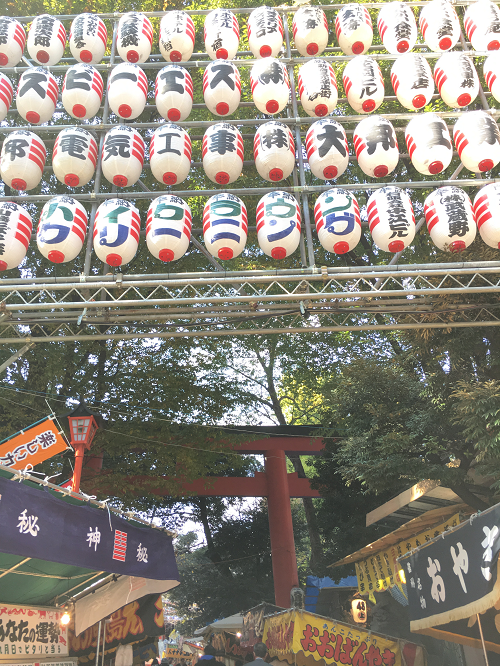
Bridging Borders: My Experience with e-Jan and the Heart of Japan -2- 国境を越えて:e-Jan と日本の心に触れた私の経験 -2-
Bridging Borders: My Experience with e-Jan and the Heart of Japan -1- 国境を越えて:e-Jan と日本の心に触れた私の経験 -1-
東京都公式動画サイト「東京動画」で当社の働き方が紹介されました
同僚のキャラを知る「3分間スピーチ」
採用サイトは「ショーウィンドウ」(後編)
5億円の借金から国内トップシェアへ──e-Janネットワークスの逆転劇 (代表取締役インタビュー)
採用サイトは「ショーウィンドウ」(前編)
社員全員でつなぐリレーエッセイ、はじめました
テレワーク時代の健康経営:当社の新制度「Aボディ手当」
高知県に移住して良かったこと -テレワークを活用した地方移住について-
Tori-no-Ichi festival

On the Tori-no-Ichi festival:
"Tori-no-Ichi Festivals are held twice or thrice every November since the Edo era.
The Festivals appellation is called first Festival "Ichinotori", the second Festival "Ninotori", the third Festival "Sannotori". The origin of "Tori-no-Ichi" Festivals of the Japanese mythology of the Ameno-Hiwashino-Mikoto and the Yamato-Takeruno-Mikoto are worshiping as god, also the Ohtori Shrine commonly are called "Otori-Sama" and the Festivals on the days be bustling by worshipers, that days celebrate the Festival all day long. And this worship is that invoke a providence, give thanks to a divine favour, both it is that pray good fortune and good news in future and keep out of harm's way . . . Then the 300 rake stalls in the yard of the Ohtori Shrine sold lucky rakes decorated with colorful symbols of good fortune,believed to bring wealth to the purchasers.” (Source)
Some comments from the employees who attended the festival:
From ‘Y.’ (Japanese):
‘平日昼間は人が少なく境内の出店も夕方の開店を目指して黙々と準備中だったので、参拝をするだけなら昼間でも良いが、お祭り感を体験したいなら夜がおすすめ。出店で売っているド派手な熊手を購入する人たちを見るのも楽しい。’
[There were few people during the weekday, and many of the food stalls were preparing to open in the evening, so while the afternoon is fine for just browsing, I recommend going at night to experience the full festival atmosphere. It is also fun to see people buying the very flashy bamboo rakes.]
From ‘E.’ (Chinese):
‘今までは個人的に神社に行きました。それはもちろん自分と家族のためにお祈りました。今回は初めて自分のためではなく、会社のために、心から心からお祈りしました。いい経験でした。’
[I have only gone to shrines on my own, and it was only to pray for myself and my family. This time I went not only for myself, but for the company, and I prayed from the bottom of my heart. It was a very good experience.]
From ‘J.’ (Taiwanese):
‘社内に置いてある熊手がいつも気になっていますから、今度の酉の市に行きました。あのような伝統行事に参加するのが初めてですが、先輩達に優しく紹介して、最後は古い熊手の返納までもさせていただきました!行って良かったと思います。’
[I had always wondered about the bamboo rake on display in the company, so I went to the Tori-no-Ichi festival. It was my first time participating in a traditional function like this, but my senpais kindly explained it to me, and at the end were able to return the old bamboo rake (to the shrine)! I’m very glad I went.]
From ‘R.’ (Taiwanese):
‘金曜日お昼頃には花園神社に行って、年一度の酉の市を参加しました。
そこで商売の神様に来年の商売繁盛を祈りました。
参拝する時に、社長の坂本さんは毎年参拝するきっかけと参拝の方法を教えてくださいました。
参拝した後、みなさんは一緒に色々な屋台に寄って、食べ物を買って、道の傍らに食べました。
気分をリフレッシュしながら、ちょっと日本の文化も勉強しました。
来年も参加します。’
[On Friday around noon we went to Hanazono Shrine to attend the annual Tori-no-Ichi festival. There, we prayed to the god of commerce for prosperous business next year. Before we went to the shrine, the company president Mr. Sakamoto explained the start of this e-Jan tradition of going to the shrine, and how to worship. Afterwards, we all browsed the stalls, bought food to eat on the side of the road. It was a good chance to feel refreshed, and to learn a bit about Japanese culture. I will go next year as well.]










